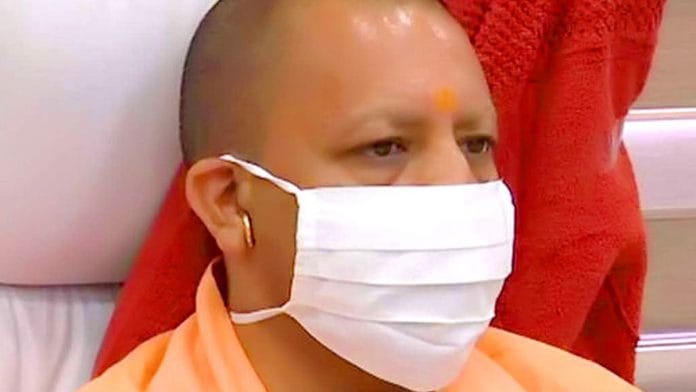Until people get caste certificates from the Tehsildar’s office, we will continue to do caste politics,” thundered Suheldev Bharatiya Samaj Party’s President Om Prakash Rajbhar in an interview. He is one of the four MLAs from his party in the state assembly of Uttar Pradesh representing the Zahoorabad constituency in Ghazipur district. The assembly elections of Uttar Pradesh are due early next year. While all other political analysts and experts in Lutyens’ Delhi consider the battle of UP to be mainly between the ruling BJP and the Samajwadi Party, and count the BSP and Congress to play a role, those who have ears to the ground can hardly ignore the fact that this 5ft 7-inch-tall rustic leader from Uttar Pradesh’s Purvanchal has become a headache to many and a talk of the town. Clad in a white kurta, trademark yellow gamcha and sports shoes, Rajbhar has formed the ‘Bhagidari Sankalp Morcha’ a coalition of 10 smaller caste-based parties with a vow to defeat the ruling BJP. He is touring the hinterlands of the state day and night to unite the marginalised communities.
O.P. Rajbhar was an ally of the BJP in the 2017 assembly elections and then Amit Shah fathomed Rajbhar’s rock-solid base among the OBC community, mainly among the Rajbhars, and decided to take him on board. Rajbhar went to the BJP, but with some conditions. One was the implementation of the social justice committee report, which talked about the sub-categorisation of the OBC quota. But two years later, Rajbhar resigned from the Yogi Adityanath cabinet, as a minister, over its non-implementation.
The OBC leader is now seen hitting the grounds, travelling every day from one district to another, further consolidating his base among the OBCs. He has managed to awaken political awareness among smaller communities. The BJP, which won a landslide victory in the 2017 election, got a huge chunk of OBC votes in the Purvanchal region. It was largely because of Rajbhar. Now he has managed to unite all the smaller outfits who used to fight elections alone earlier and has brought them under one umbrella.
Also read: Eye on Purvanchal, BJP ties up with Nishad Party for 2022 UP assembly election
Owaisi steps up
There are other smaller parties who are trying to create a niche for themselves in Uttar Pradesh. AIMIM supremo Asaduddin Owaisi is one such leader who is regularly touring the state and drawing huge crowds with his oratory skills. His party is organising the ‘Shoshit Vanchit Samaj Sammelan’ and are trying to project themselves as a viable political choice for the minorities of UP. Owaisi, in his rallies, is speaking on the subjugation of minorities in the state by successive governments and how their social, economic, political indicators are the lowest. He talks about attaining “political empowerment” and “political power”. People accuse him of doing communal politics, but if one listens to his speeches carefully, the underlying point he draws home is the under-representation of minorities and achieving justice, liberty, equality, fraternity.
The Muslim community has the lowest literacy rate in UP, but has the highest undertrials in jail and highest college dropout rate. Their social, economic, educational indicators are abysmal. As Kanshiram said, “Jiski jitni sankhya Bhaari, uski utni hissedaari.” Every community has to get their share according to its population. Muslims constitute around 20 per cent of UP’s electorate, but their representation in every field is meagre. There is a growing disillusionment among the community and Owaisi’s party is trying to capitalise on it.
Also read: Yogi expands his Cabinet, but still keeps SC/STs away from real power
Chandrashekhar Azad on the ground
The same kind of political churning is seen among the Dalit community, especially among the youth, especially since the Bahujan Samaj Party is drifting away from its founding principles. Mayawati is holding the ‘Brahman Sammellans’ in order to woo the Brahmin community, and alluding to their ‘oppression’. All of this has created a space in Dalit politics that the fiery Dalit icon Chandrashekhar Azad wants to fill in. His newly formed Azad Samaj Party had won impressive seats in the recently concluded Zilla Panchayat elections. With Mayawati only tweeting, a section of Dalits see Azad as the one among them, who would fight for their cause.
All this suggests that there is space and a political awakening among the most marginalised, suppressed, exploited communities of Uttar Pradesh. Babasaheb Ambedkar rightly said, “Political power is the master key.” These parties, by carrying their respective communities’ interests and aspirations, are striving towards that goal and striving to get their due share in India’s democracy. As Prof. G. Aloysius argues in his book Nationalism Without A Nation, marginalised communities fighting for equal share and heterogenisation of power are the real nationalist movements. The undercurrent is visible and these parties will go on to win considerable seats and could even emerge as the deciding factor. One can ignore them at their own cost.
Khalil ur Rehaman Savanur is a student of Karnataka State Law University, Hubli. Views are personal.






